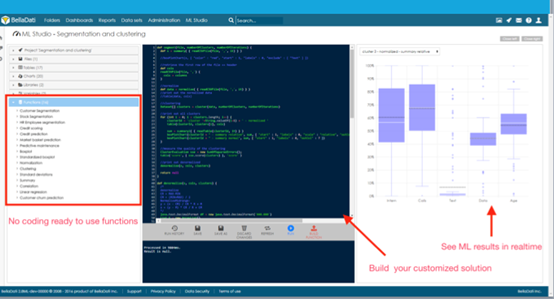BellaDati ML Studio is an integrated platform/framework for developing and running sophisticated situational intelligence applications. These are applications that are used in IoT area, but also for extensive big data cleaning tasks and other machine learning and statistical situational applications.
BellaDati Advanced Analytics Tool and Framework
BellaDati ML Studio is the integral part of BellaDati Advanced Analytics Tool and Framework. BellaDati Advanced Analytics and Framework has following major features:
- ML Studio
- Rich and agile reporting and dashboarding layer
- Rich SDK, REST API and Client API ready for embedding and customization
- ETL
- mobile
- integrated datawarehouse
- multitenant cloud.
BellaDati ML Studio
The ML Studio has following major features:
- Runs applications and interfaces to data sources and analytics models
- A visual framework for users to interact with data and analytical results
- A development environment for assembling data, analytics into situational intelligence applications
- Development environment offers for the mathematical modeling and predictions
- The access to BellaDati preconfigured packages/BellaDati Domain Specific language
- For users to create their own packages
- Access to various Java libraries (eg Java ML, Appache Commons Math 3, Stat library, etc)
- Usage of Python and its libraries (especially Anaconda libraries) from the environment of ML Studio is the option
- To User to write her/his own scripts using preconfigured building blocks and pack them.
- Usage of R and R-Cran libraries from the environment of ML Studio is the option.
Prebuilt functions
ML Studio has been used by BellaDati to prebuilt functions for the most frequent IoT tasks as predictive maintenance and situational intelligence as customer segmentation or market basket analytics. These can be used without the programming, only using graphical interface for the specification of parameters. At the same time it allows partners and organizations to build their own statistical and ML cases.
All of the following functions are supported and solutions can be built:
- Max, min, standard deviation, mean, median, 1st quartile, 3rd quartile, in the predefined function called summary. Graphic forms is available in the form of box plot, relative box plot, outliers and histogram.
- Confidence interval and hypothesis testing using basic statistical capabilities (e.g. T Test, Chi-Square) are available.
- The distribution of objects into predefined classes or categorical variables is enabled.
- The prediction of the value of an unknown, continuous variable is available.
- Available algoritmus allows to identify logical groups in which to place similar objects.
- Classification, estimation or clustering about a value or behaviour are available.
- Functions to determine which objects can be expected to co-occur with other objects (e.g. market basket analysis) are available.
- Functions that are able to identify the independent variables that have the biggest impact on a dependent variable are available.
- ML studio functions are able to parse unstructured content to create structured data objects (i.e. columns) that can be used for predictive modelling.
- ML studio supports support real-time scoring from models that use historical and real-time data.
- ML studio supports user-defined algorithms in a plug-and-play fashion and import / export via PMML.
- ML studio provides advanced search capabilities, for example given a registration number, the solution can determine the entity (ROC, ROB, LLP, etc.), or suggest the closest match. Search by keyword should also be supported, for example given a partial name.
- Decision trees and neural networks are available.
